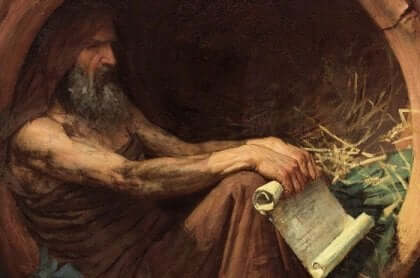The phrases of Diogenes, the cynic, speak of one of the most honest philosophers of all time, that is, someone with a real desire to understand reality and come to the truth, without any additional interest but love of truth.
There are not many phrases of Diogenes, the cynic, since he never wrote, what has happened to ours, we know it for his disciples, especially his playboy, Diegenes Laércio, who was entrusted to collect several of his teachings.
- “Wisdom serves as a brake on youth.
- Comfort for the elderly.
- Wealth for the poor.
- And adornment of the rich.
- “Diogenes.
- The cynic.
The main characteristic of this philosopher, born in Sinope and famous in Athens, was his enormous detachment, above all he loved freedom and was not afraid to tell the truth to the powerful, it was said that he lived in a barrel and many thought he was a beggar. Here are some of the best-known phrases of Diogenes the Cynic.
One of the phrases of Diogenes, the cynic, says: “Insult dishonor those who deduce it, not those who receive it. “This means that the error is usually in the mind of the unjust person, not in the being or nature of the person. who is the subject of the infringement.
Despite this, Diogenes himself was known for using very harsh phrases to shape his truth, however, his complaint had more to do with double morality and ethical flaws than with a particular person, he did not seek to attack the person, but to question his moral position.
One of his disciples, Hecatus, left in writing one of the phrases of Diogenes, the cynic, who apparently pronounced it more often: “The company of crows is preferable to that of the flattery, who devour the dead, and these alive. “
If anything hated this philosopher were the flatterers, he became famous for an episode: Alexander the Great sought him attracted by his prestige, introduced himself and said that he could ask for anything, Diogenes asked him to walk away because he was blocking sunlight.
It is said that once Diogenes stopped to see a child drink water with his hands and drink. The philosopher had very few personal effects, including a bowl. But when he saw the boy, he said, “Did a child outperd me in simplicity?and threw away the bowl.
On another occasion he observed that another child was eating on a leaf, they were lentils and he used bread, like a spoon, to get into his mouth, when diogenes imitated him he abandoned his bowl and has since eaten like this.
This is one of the phrases of Diogenes, the cynic, of which there is no absolute certainty of fatherhood. He says: “It is silent that one learns to listen, listening that one learns to speak; so, as you speak, you learn to be silent?
If the phrase does not come from Diogenes it is consistent with your thinking, that is, communication is a complex process in which listening is fundamental, this is what allows you to learn to speak first. And knowing how to talk means understanding when to shut up.
It tells the story that one of the Athenian citizens, impressed by the degree of poverty in which Diogenes lived, approached him and asked, “Why do people give money to beggars and not to philosophers?
Diogenes thought for a moment and then replied, “Why do you think you might one day become disabled or blind, but philosophers, ever?”An ingenious way of saying that charity is inspired by a kind of selfishness, which feeds mostly on help. inspired by selfishness. This equation does not include virtues, but deficiencies; empathy enters, but fear.
In the time of Diogenes, philosophers were much appreciated, he may have lived as a protégé of the nobles, amid luxury and privilege, but he chose to leave everything to achieve the greatest degree of authenticity. is remembered thousands of years later.

